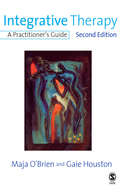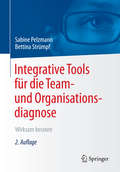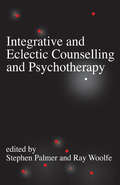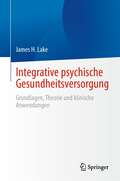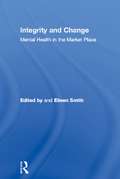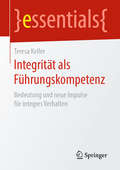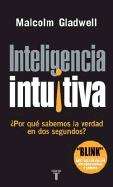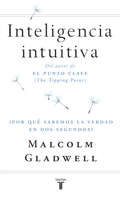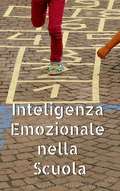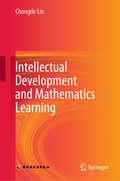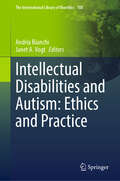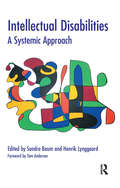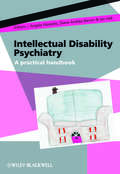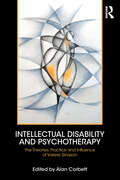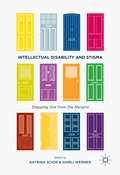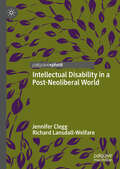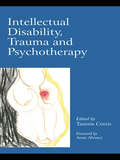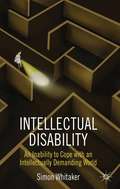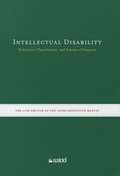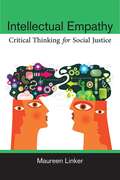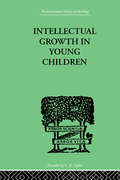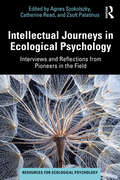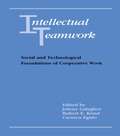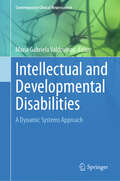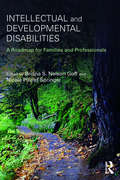- Table View
- List View
Integrative Therapy: A Practitioner's Guide
by Ms Gaie Houston Dr Maja O'Brien`The book is comprehensive, and extensively researched and referenced. ....[The] last chapter contains some excellent training resources for trainers of counsellors/psychotherapists. I would therefore endorse it as a useful textbook, especially as there is an excellent in-depth example of an assessment form, and guidance on how this can be used for trainees. These were useful revision points to me as an experienced counsellor' - The Independent Practitioner `The book would be useful to practitioners who want to start thinking 'outside the box' of a particular orientation. It is also aimed at students and trainers - the last 40 pages in particular are full of practical training exercises. Overall, I would recommend it as a well-reasoned argument for therapy to be rooted in an integrative base' - Therapy Today `Throughout the book it is assumed that we can learn from each other and that we need to, whatever orientation we were trained in, in the service of the client. I find this pragmatic approach open and refreshing in a period when some of us have polarised around the 'what works best' debate. Both authors are experienced practitioners and trainers and their commitment to integrative counselling and psychotherapy shines through' - AUCC Journal Integration rather than a single theory has become accepted and widely recommended as a way forward in psychotherapy and counselling. Integrative Therapy, Second Edition, a timely and innovative guide for practitioners, is based on the view that training and practice methods should be evaluated for their usefulness to the client instead of their adherence to a particular model. Drawing from research on therapy process and outcome, and on human development respectively, the authors highlight striking similarities between the change processes involved in these two areas of study. The findings provide a basis for an adaptable framework for integrative practice. The authors pinpoint what is common as well as what is different in various approaches, using case illustrations to make comparisons throughout between the three major models: psychodynamic, humanistic-existential and cognitive-behavioural. What emerges is the central importance of the therapeutic relationship in the process of change - 'how to be with clients' as opposed to 'what to do'. Fully revised and updated, this Second Edition includes new material on neuroscience and practitioner-oriented research methodology showing how the processes of doing research and doing therapy have many things in common. The book aims to cultivate a spirit of willingness amongst therapists trained in one model to learn from colleagues trained in others. It also features exercises to support its use on courses and will thus be invaluable to trainees of counselling, psychotherapy and counselling psychology. Maja O'Brien is a chartered counselling psychologist and psychotherapist, supervisor and trainer based in Oxford and a Principal Lecturer on the Doctorate in Psychotherapy by Professional Studies run jointly by the Metanoia Institute and Middlesex University. Gaie Houston is a writer, UKCP-registered psychotherapist and senior lecturer at The Gestalt Centre, London.
Integrative Tools für die Team- und Organisationsdiagnose
by Sabine Pelzmann Bettina StrümpfKernstück des Buches sind konkrete Tools, die zur Team- und Organisationsdiagnose eingesetzt werden können. Vorgestellt werden dabei die Prinzipien des Integrativen Ansatzes (Hilarion G. Petzold) sowie ausgewählte Aspekte der Organisationsdiagnose. Das Buch richtet sich an Supervisor/innen, Coaches, Organisationsberater/innen, Unternehmensberater/innen und Personalentwickler/innen.
Integrative and Eclectic Counselling and Psychotherapy
by Stephen Palmer Ray WoolfeStephen Palmer is Joint award winner of the Annual Counselling Psychology Award for outstanding professional and scientific contribution to Counselling Psychology in Britain for 2000. `The editors' support for the integrative project is clear, but the book will hold its own with the sceptics too. I recommend it' - Counselling at Work This innovative and timely book examines the issues and ideas surrounding integration and eclecticism in a therapeutic context, and provides a detailed account of a wide range of approaches in use. Following an exploration of the origins of integrative and eclectic processes, 10 approaches are explained in detail. Chapters on each approach: describe its central concepts, assumptions and therapeutic goals; outline its view of how psychological disturbance is acquired, perpetuated and resolved; examine how the theory relates to practice - including examples of typical sessions and case studies; and consider which clients might benefit. Further chapters explore the implications of using integrative and eclectic approaches for training, supervision, for working in a time-limited context and from a multicultural perspective.
Integrative psychische Gesundheitsversorgung: Grundlagen, Theorie und klinische Anwendungen
by James H. LakeDieser wichtige Band bietet einen prägnanten Überblick über die konzeptionellen Grundlagen und klinischen Methoden, die der schnell entstehenden Subspezialität der integrativen psychischen Gesundheitspflege zugrunde liegen. Es werden Methoden erörtert, die Praktiker zu individualisierten integrativen Strategien anleiten, die sich mit den einzigartigen Symptomen und Umständen jedes einzelnen Patienten befassen, und es enthält praktische klinische Techniken zur Entwicklung von Interventionen, die auf Wohlbefinden, Prävention und Behandlung ausgerichtet sind.In der Übersicht enthalten:· Bewältigung der Herausforderungen psychischer Erkrankungen durch integrative psychiatrische Versorgung.· Sich verändernde Paradigmen und ihre Auswirkungen auf die psychische Gesundheitsversorgung· Modelle des Bewusstseins: Wie sie das Verständnis von normaler psychischer Funktion und psychischer Krankheit prägen· Methodische Grundlagen der integrativen psychiatrischen Versorgung· Behandlungsplanung in der integrativen psychiatrischen Versorgung· Die Zukunft der psychischen GesundheitspflegeA New Paradigm for Integrative Mental Healthcare (Ein neues Paradigma für die integrative psychische Gesundheitspflege) ist für die wachsende Zahl von Patienten, die eine integrative und alternative Behandlung für depressive Verstimmungen, Angstzustände, ADHS, bipolare Störungen, Schizophrenie und andere psychische Gesundheitsprobleme wie Müdigkeit und chronische Schmerzen suchen, relevant und zeitgemäß."Die Patienten schreien nach einem integrativen Ansatz, und dieses beispielhafte Buch liefertdie Vorlage für die Verwirklichung einer solchen Vision." -Jerome Sarris, MHSc, PhD, ND"Für die meisten konventionell ausgebildeten Kliniker besteht die Herausforderung nicht in der Frage "Funktioniert die Alternativmedizin?", sondern "Wie integriere ich die Alternativmedizin in meine klinische Praxis?" Lakes umfassender Ansatz beantwortet diese zentrale Frage und befähigt den Kliniker, eine wirklich integrative und effektive Pflege für Geist und Körper zu planen." -Leslie Korn, PhD, MPH
Integrity and Change: Mental Health in the Market Place
by Eileen SmithIntegrity and Change: Mental Health in the Market Place examines how workers in the caring professions might preserve their integrity and ability to reflect and act purposefully in the face of such rapid and extensive change.
Integrität als Führungskompetenz: Bedeutung und neue Impulse für integres Verhalten (essentials)
by Teresa KellerIn diesem essential zeigt Teresa Keller, wie integres Verhalten entwickelt und dauerhaft aufrechterhalten werden kann. Die Autorin verdeutlicht die Bedeutung sowie Wirkung von Integrität und erläutert Faktoren wie Achtsamkeit, Haltung, Anstand und emotionale Intelligenz, die maßgeblich an Integrität beteiligt sind. Vor allem aber macht sie die Relevanz von Integrität als Führungskompetenz klar – zu oft wird Integrität als nachrangiges Führungs- und Unternehmensziel behandelt.
Inteligencia intuitiva
by Malcolm GladwellEn este libro revolucionario, el periodista estadounidense Malcolm Gladwell nos explica cómo pensamos sin pensar, de dónde proceden las decisiones que parece que tomamos en dos segundos, pero que no son tan simples como aparentan. ¿Por qué algunas personas son brillantes a la hora de decidir y otras son torpes una y otra vez? ¿Por qué algunos siguen su instinto y triunfan, mientras que otros acaban siempre dando un paso en falso? ¿Cuál es el funcionamiento real del cerebro en el trabajo, en clase, en la cocina o en la cama? ¿Y por qué las mejores decisiones suelen ser las más difíciles de explicar? Gladwell nos presenta a un psicólogo que ha aprendido a predecir si un matrimonio puede durar con sólo observar a sus miembros unos minutos; a un entrenador de tenis que sabe cuándo un jugador cometerá doble falta antes incluso de que la raqueta toque la bola; a un experto en antigüedades que reconoce una falsificación de un solo vistazo. Este libro revela que quienes son buenos tomando decisiones no son aquellos que procesan más información o que dedican más tiempo a deliberar, sino aquellos que han perfeccionado el arte de hilar fino, de extraer los pocos factores que realmente importan a partir de una cantidad desmesurada de variables. Por medio de la neurología y la psicología, y exhibiendo todo el esplendor del que este autor es capaz, Inteligencia intuitiva cambia nuestra forma de tomar decisiones y revoluciona nuestra manera de pensar.
Inteligencia intuitiva: ¿Por qué sabemos la verdad en dos segundos?
by Malcolm Gladwell¿Por qué algunas personas son brillantes tomando decisiones y otras son torpes una y otra vez? ¿Por qué algunos siguen su instinto y triunfan, mientras que otros acaban siempre dando un paso en falso? En este libro revolucionario, el periodista estadounidense Malcolm Gladwell nos explica cómo pensamos sin pensar, de dónde proceden las decisiones que parece que tomamos en dos segundos, pero que no son tan simples como aparentan. ¿Por qué algunas personas son brillantes tomando decisiones y otras son torpes una y otra vez? ¿Por qué algunos siguen su instinto y triunfan, mientras que otros acaban siempre dando un paso en falso? ¿Cuál es el funcionamiento real del cerebro en el trabajo, en clase, en la cocina o en la cama? ¿Y por qué las mejores decisiones suelen ser las más difíciles de explicar? Gladwell nos presenta a un psicólogo que ha aprendido a predecir si un matrimonio puede durar con sólo observarles unos minutos; a un entrenador de tenis que sabe cuándo un jugador hará doble falta antes incluso de que la raqueta toque la bola; a un experto en antigüedades que reconoce una falsificación de un solo vistazo. Este libro revela que quienes son buenos tomando decisiones no son aquellos que procesan más información o que dedican más tiempo a deliberar, sino aquellos que han perfeccionado el arte de hilar fino, de extraer los pocos factores que realmente importan a partir de una cantidad desmesurada de variables. Por medio de la neurología y la psicología, y exhibiendo todo el esplendor del que este autor es capaz, Inteligencia intuitiva cambia nuestra forma de ver las decisiones que tomamos. Nunca más volverás a pensar en pensar de la misma manera. Reseñas:«Un mago en los libros de autoayuda. Con más de 10 millones de ejemplares vendidos, Malcolm Gladwell es uno de los principales escritores motivacionales, gurú del éxito y analista de "estrategias para triunfar". La clave del éxito, Inteligencia intuitiva, Lo que vio el perro y Fuera de serie son libros que ejecutivos y líderes de todo tipo devoran en los aeropuertos.»La Gaceta de los negocios «¿Debería comprar este libro? Es probable que ya intuya la respuesta.»Independent on Sunday «Si Gladwell tiene razón, comprarán este libro. Y eso confirmará su tesis.»Stephen Bayley, The Guardian «Confíe en mi intuición: si compra este libro quedará encantado.»The New York Times «Convincente y diabólicamente inteligente.»Evening Standard «Brillante. Las implicaciones para los negocios, por no hablar del amor, son inmensas.»The Observer «Fantástico. Este maravilloso libro debería ser de lectura obligada.»The New Statesman «Sencillamente este libro podría cambiar tu vida.»Esquire
Inteligenza Emozionale nella Scuola
by Juan Moisés de la SernaSiamo di fronte ad un eccellente libro il cui materiale è chiaro e completamente didattico, indicando non solo gli specialisti nel campo della psicologia, ma anche educatori e psicologi dell'educazione, personale cruciale per il corretto sviluppo dei comportamenti nei giovani, negli adolescenti in particolare nel campo scolastico, e anche nella loro naturale evoluzione.
Intellectual Development and Mathematics Learning
by Chongde LinThis book introduces the outcomes of author’s 40 years of research, especially the theory of “the Triangular Pyramid Structure of Thinking” that he independently proposed, and the application of his development theory in the field of mathematics education. The book firstly explains the substantial character of intelligence, the development law of intelligence, and the relationship between intelligence development and creativity cultivation. Secondly, it discusses the structure of mathematical thinking of children and adolescents from 0 to 18 years old, and the methods of developing students’ thinking ability and the quality of intelligence through arithmetic learning. In the end, this book also demonstrates the characteristics of the development of mathematical thinking ability of children at age 0-6, elementary school students, and secondary school students, and the related latest research in this field. Based on the theory of “the Triangular Pyramid Structure of Thinking”, a number of examples are given to illustrate how the theory of intelligence development can be used in mathematics teaching to promote the development of students’ thinking abilities and to improve the quality of teaching.This book covers various areas including psychology, mathematics, and education. It has a great reference value for scholars in the field of psychology to study the theory of intelligence and the structure of thinking, providing guidance for parents and mathematics teachers to promote children’s quality of intelligence and mathematical thinking abilities, and to enhance their mathematics learning effects. In addition, it provides examples for psychological research to serve specific subject teaching in elementary and secondary schools.
Intellectual Disabilities and Autism: Ethics and Practice (The International Library of Bioethics #108)
by Andria Bianchi Janet A. VogtThis book meaningfully reflects upon difficult, timely, and debated ethics questions relating to people with intellectual disabilities (IDs) and autistic people. The book challenges now dated perceptions and introduces innovative ideas by leading scholars regarding some of the most complex, controversial, and relevant ethical dilemmas involving these neurodiverse populations. People with IDs and/or those on the autism spectrum continue to experience various forms of oppression and unjust treatment across the globe, despite the UN Convention on the Rights of Persons with Disabilities (CRPD). The collection explores questions such as: Can people with IDs make informed decisions about their medical treatment, living circumstances, and overall life? What are the ethical implications of selective termination of pregnancy based on a gene linked to a condition conferring intellectual impairment? How can we ensure that people with IDs and autistic people are meaningfully included in research? Can people with IDs successfully parent? How can we support the capabilities of neurodiverse populations such that they enjoy the rights afforded by the CRPD? Each contributor critically examines how we can move forward to create a world that understands and respects the rights of every person with ID and/or autism. An indispensable read for bioethicists, ethics students, social justice scholars, and others interested in and working with people with IDs and autistic people.
Intellectual Disabilities: A Systemic Approach (The Systemic Thinking and Practice Series)
by Sandra Baum Henrik LynggaardThe application of systemic ideas and principles in working with people with intellectual disabilities, their families and their service systems, has grown over the last decade in the UK. This book, for the first time, brings together the writings of a group of practitioners who have been using this approach in their clinical practice. It is hoped it will inspire others to try out different ways of working with people with intellectual disabilities and their wider systems, so that they can have the choice of a wide range of therapeutic approaches. It is also hoped that systemic practitioners who are unfamiliar with this client group might give consideration to extend their practice to also work with people with intellectual disabilities.
Intellectual Disability Psychiatry
by Diana Andrea Barron Angela Hassiotis Ian HallIntellectual Disability Psychiatry is a comprehensive and accessible guide to the management of mental health problems in people with intellectual disabilities. A clear and user-friendly handbook, it will help busy healthcare professionals develop their understanding of the mental health problems of service users with intellectual disabilities. Most importantly, it will help them make an accurate diagnostic assessment and develop and implement an holistic, person-centred, evidence-based management plan.Topics covered include the classification of mental disorders in intellectual disability, the clinical assessment of specific disorders, psychological, psychopharmacological and social interventions, and the practical, legal, and social aspects of supporting service users with intellectual disability who have mental health problems.
Intellectual Disability and Psychotherapy: The Theories, Practice and Influence of Valerie Sinason
by Alan CorbettIntellectual Disability and Psychotherapy: The Theories, Practice and Influence of Valerie Sinason charts the transformative impact of the noted psychotherapist’s work with children and adults with intellectual disabilities upon both a generation of clinicians and the treatment and services delivered by them. Examining how contemporary Disability Therapists have discovered, used and adapted such pioneering concepts as the Handicapped Smile and Secondary Handicap as a Defence Against Trauma in their clinical work, the book includes contributions from renowned practitioners and clinicians from around the world. It shines a light on how Sinason’s work opened doors for working with people who were previously thought of as unreachable. Intellectual Disability and Psychotherapy will be an essential resource to anyone working with children or adults with disabilities, as well as psychotherapists interested in exploring Valerie Sinason’s work.
Intellectual Disability and Stigma
by Katrina Scior Shirli WernerThis book examines how intellectual disability is affected by stigma and how this stigma has developed. Around two per cent of the world's population have an intellectual disability but their low visibility in many places bears witness to their continuing exclusion from society. This prejudice has an impact on the family of those with an intellectual disability as well as the individual themselves and affects the well-being and life chances of all those involved. This book provides a framework for tackling intellectual disability stigma in institutional processes, media representations and other, less overt, settings. It also highlights the anti-stigma interventions which are already in place and the central role that self-advocacy must play.
Intellectual Disability in a Post-Neoliberal World
by Jennifer Clegg Richard Lansdall-WelfareThis book suggests and promotes new paradigms for intellectual disability. Challenging the predominant neoliberal agenda, it combines extensive clinical experience, conceptual analysis, and recent research. The authors explore the way that promotion of autonomy and choice overlooks the fundamentally relational needs of people with intellectual disabilities by examining four significant, repeating themes. What neoliberal policies are and how they suffocate innovation; the recurring scandals that characterise ID services in all cultures; the counter-intuitive belief that behavioural interventions can somehow address emotional distress; and fundamental tensions in the relationship between parents and services. Each chapter proposes alternative and hopeful ways to address the 40% of people with intellectual disabilities whose distress generates challenges for parents and staff. Written primarily for intellectual disability researchers, professionals, service managers, and policy-makers, this book constitutes a useful reading also for scholars in psychology, psychiatry and nursing, as well as specialist historians, geographers, sociologists, and social anthropologists engaged with intellectual disabilities.
Intellectual Disability, Trauma and Psychotherapy
by Tamsin CottisPeople with intellectual disabilities have emotional and mental health needs just like anyone else. Until recently however there has been little research of effective psychological treatment or direct, accessible psychotherapy provision for this client group. Intellectual Disability, Trauma and Psychotherapy focuses on the delivery of psychotherapy services for those with intellectual disabilities. Leading professionals in this specialist field are brought together to describe the history, theory and practice of their work in twelve focused chapters that draw on the work of psychotherapists including Bion, Winnicott, Sinason and Alvarez. Topics covered include: therapeutic responses to cultural and religious diversity support for parents with intellectual disabilities developing healthy and secure attachments within the family dealing with intense feelings of shame helping clients to cope with traumatic sexual experiences. Drawing on over a decade of pioneering practitioner experience at Respond – a government-funded psychotherapy service for people with learning disabilities based in central London – this book explores the practical issues in providing therapy to this client group, whether individually, in families, in groups, or by the use of telephone counselling. It closes with a chapter exploring the way forward for those who wish to develop services of this kind.
Intellectual Disability: An Inability to Cope with an Intellectually Demanding World
by Simon WhitakerThe current construct of intellectual disability is based on the assumption that both IQ and adaptive behaviour can be measured accurately. Intellectual Disability explains how and why this is not fit for purpose and that it is actually neither necessary nor reasonable to have a single construct of intellectual disability.
Intellectual Disability: Definition, Classification, and Systems of Supports (Eleventh Edition)
by The AAIDD Ad Hoc Committee on Terminology ClassificationThis Manual contains the most current and authoritative information and knowledge on intellectual disability, including best practice guidelines on diagnosing and classifying intellectual disability and developing a system of supports for people living with an intellectual disability.
Intellectual Empathy: Critical Thinking For Social Justice
by Maureen LinkerIntellectual Empathy provides a step-by-step method for facilitating discussions of socially divisive issues. Maureen Linker, a philosophy professor at the University of Michigan–Dearborn, developed Intellectual Empathy after more than a decade of teaching critical thinking in metropolitan Detroit, one of the most racially and economically divided urban areas, at the crossroads of one of the Midwest’s largest Muslim communities. The skills acquired through Intellectual Empathy have proven to be significant for students who pursue careers in education, social work, law, business, and medicine. Now, Linker shows educators, activists, business managers, community leaders—anyone working toward fruitful dialogues about social differences—how potentially transformative conversations break down and how they can be repaired. Starting from Socrates’s injunction know thyself, Linker explains why interrogating our own beliefs is essential. In contrast to traditional approaches in logic that devalue emotion, Linker acknowledges the affective aspects of reasoning and how emotion is embedded in our understanding of self and other. Using examples from classroom dialogues, online comment forums, news media, and diversity training workshops, readers learn to recognize logical fallacies and critically, yet empathically, assess their own social biases, as well as the structural inequalities that perpetuate social injustice and divide us from each other.
Intellectual Growth In Young Children: With an Appendix on Children's "Why" Questions by Nathan Isaacs
by Isaacs, SusanRoutledge is now re-issuing this prestigious series of 204 volumes originally published between 1910 and 1965. The titles include works by key figures such asC.G. Jung, Sigmund Freud, Jean Piaget, Otto Rank, James Hillman, Erich Fromm, Karen Horney and Susan Isaacs. Each volume is available on its own, as part of a themed mini-set, or as part of a specially-priced 204-volume set. A brochure listing each title in the "International Library of Psychology" series is available upon request.
Intellectual Journeys in Ecological Psychology: Interviews and Reflections from Pioneers in the Field (Resources for Ecological Psychology Series)
by Agnes Szokolszky Catherine Read Zsolt PalatinusIntellectual Journeys in Ecological Psychology: Interviews and Reflections from Pioneers in the Field presents 12 in-depth interviews with prominent scientists associated with Ecological Psychology, rooted in James Gibson’s radical approach to perception. Featuring a mix of interviews conducted around the turn of the millennium with leading figures of Ecological Psychology, the book reveals discussions not previously found in publications and authentic personal perspectives about the early days of Ecological Psychology, a significant paradigm of post-cognitivist psychology. The interviews are supplemented by current reflections that bridge the past to the present. Each interview chapter also contains a brief biography of the interviewee and a list of their top ten most significant publications. An introductory chapter by Harry Heft provides an overview of Gibson’s theory and the post-Gibsonian theoretical landscape. A further chapter by the editors highlights lineages and patterns in the scientific careers and work of the interviewees. An epilogue by William Warren concludes the volume, addressing the current state and directions of Ecological Psychology. In the Appendix photographs taken by Sverker Runeson in the 1960s and 1970s show scenes and actors from scientific event in Ecological Psychology. This book will be beneficial to all researchers and students in the international community of Ecological Psychology. It will also serve as a starting point for those who wish to learn more about the movement and origins of Ecological Psychology.
Intellectual Teamwork: Social and Technological Foundations of Cooperative Work
by Robert E. Kraut Jolene Galegher Carmen EgidoThis book seeks to establish an interdisciplinary, applied social scientific model for researchers and students that advocates a cooperative effort between machines and people. After showing that basic research on social processes offers much needed guidance for those creating technology and designing tools for group work, its papers demonstrate the mutual relevance of social science and information system design, and encourage better integration of these disciplines. This comprehensive collection closely examines the variety of electronic tools being deployed to solve traditional problems in communication and coordination. Unfortunately, research shows that these tools have not been as successful as their designers had envisioned, partially because they were not always produced with the needs and goals of their human users in mind. The editors' goal is to entice more social scientists to orient their research around questions of practical interest to information system designers and to convince designers to search for the knowledge about social and organizational behavior that would make their tools more useful.
Intellectual and Developmental Disabilities: A Dynamic Systems Approach (Contemporary Clinical Neuroscience)
by Maria Gabriela ValdovinosThis new reference provides a comprehensive overview of intellectual and developmental disabilities, incorporating multiple perspectives and disciplines (including developmental neuroscience, genetics, psychiatry, and psychology) with a multifaceted approach, offering readers appreciation for the richness of the population and field. It provides readers with an understanding of the developmental, biological, and behavioral aspects of developmental disabilities with the aim of understanding their causes, the differences between disabilities, and familiarity with the prognosis and developmental outcomes for children diagnosed with various developmental disabilities.
Intellectual and Developmental Disabilities: A Roadmap for Families and Professionals
by Briana S. Nelson Goff Nicole Piland SpringerIntellectual and Developmental Disabilities provides a unique contribution not currently available in the professional literature by addressing the experiences and perspectives of families living with or raising a child with a disability. Designed for family therapists, social workers, and other helping professionals, it provides empirically-based, practical information for working with families experiencing intellectual and developmental disabilities of a loved one. This book also provides important information for navigating the various professional systems of care with which these families interface: health care providers, early childhood intervention teams, educational systems, the legal system, and financial planners.
